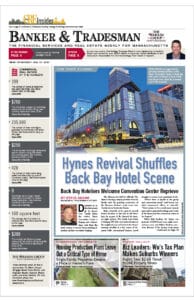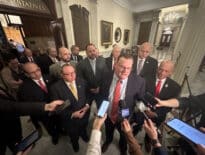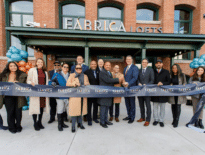
An MBTA Green Line trolley pulls into the Newton Centre station in 2019. Photo by Arnold Reinhold | CC BY-SA 4.0
Newton city councilors appear to have met the deadline to pass an upzoning package to allow more multifamily development near the city’s Green Line and commuter rail stations, approving a plan 21-2 Monday night that still exceeds the minimum number of units required under state law.
Monday’s vote came after three years of contentious debate, pitting pro-housing residents and city councilors against a well-organized set of opponents who had threatened to force a referendum vote on the zoning – an outcome many observers feared could deal a body blow to region-wide efforts to implement the state’s MBTA Communities transit-oriented zoning law
The package covers Newton Centre, Newton Highlands, Waban, West Newton, Newtonville and Auburndale – the last a critical consideration as the city seeks state and federal help to rebuild its three MBTA commuter rail stations, help officials indicated was contingent on zoning for more density near each station.
Advocates celebrated Monday’s vote as a historic step.
The city’s main housing advocacy group Engine 6 issued its congratulations to city councilors “for passing the most significant zoning reform in Newton in decades.
“This zoning sets new ground rules that will increase the opportunity to build more affordable homes – both deed-restricted affordable homes and market-rate homes that will cost less than the huge single family homes and townhouses of today,” the group said in a statement. “The new zoning starts to reverse decades-old land-use policies that have made Newton an increasingly expensive place to live, especially for seniors and young families.”
And Newton for Everyone, the coalition of housing advocates, clergy, businesses and other interest groups organizing support for the zoning proposal, called the moment “an important first step.”
“Updated zoning in six village centers will enhance Newton’s ability to provide housing opportunities that are more affordable for seniors looking to downsize, families just starting out, and people who serve our community,” the group said. “These environmentally responsible reforms will build village vitality and support our businesses.”
Amendments passed Monday and in prior council meetings in November reduced the amount of new and existing multifamily units allowed under the new zoning to around 400 over the state-mandated 8,330.
But they cut down the scale of as-of-right building allowed on many lots so far, and added parking requirements big enough that some councilors voiced fears the resulting zoning wouldn’t allow economically viable buildings, at all.
The changes pushed at-large Councilor Alison Leary to switch her vote and become just one of two to oppose the rezoning.
“I understand the art of compromise going on here, but what we’ve done is essentially eviscerated our work we’ve done in the last three years. We have a climate crisis, we have a housing crisis, and I’m concerned we’ve undercut so much, we’ve given up so much that very little, I think, will get built,” she said.
And Councilor Deb Crossley, who led the political process to come up with the rezoning plan, said during Monday’s meeting she feared state officials could reject the package she and her colleagues were poised to pass.
“What I’m concerned about in this package is not the villages I’m leaving out, but the reduction of the a four-and-a-half-story building to a three-and-a-half-story building. We know we’re on the cusp of economic feasibility – not profit, but feasibility. This is what the state was worried about when they put these rules in place,” around ground-floor retail requirements in MBTA Communities zoning, she said. “We are very much less sure now whether we’re going to be able to meet the bar there.”
If the state Department of Housing and Livable Communities sends the zoning package back to the Newton City Council for revisions, though, Crossley, Leary and several of their colleagues won’t be there to vote on the matter. They and other pro-housing councilors were turfed out in November’s municipal election by a highly organized campaign against them driven in part by alleged misinformation about the scale of development that the rezoning proposal would allow.
Whether or not the city has to amend its zoning, forces that had pushed to liberalize the city’s zoning appear to be planning to re-fight the battles over additional density that they lost this fall. In its statement on Monday’s vote, Newton for Everyone declared that”[t]here is still more to be done to bring housing opportunities and economic development to the additional six villages not included in the new zoning,” and that it “looks forward to continuing our efforts to create a broader range of residential options in Newton.”
And Crossley was optimistic that the next council will face pressure from homeowners near village centers to expand the transit-oriented zoning districts, especially one that allows three units on what were heretofore large single-family lots.
“You’ll have the opportunity to use the ordinance next term, if you have the wherewithall, to expand it once you see how much is being denied to some of our village centers,” she said. “There are going to be people coming in, I believe, who will want this zoning from whom it has been taken away once they see.”






